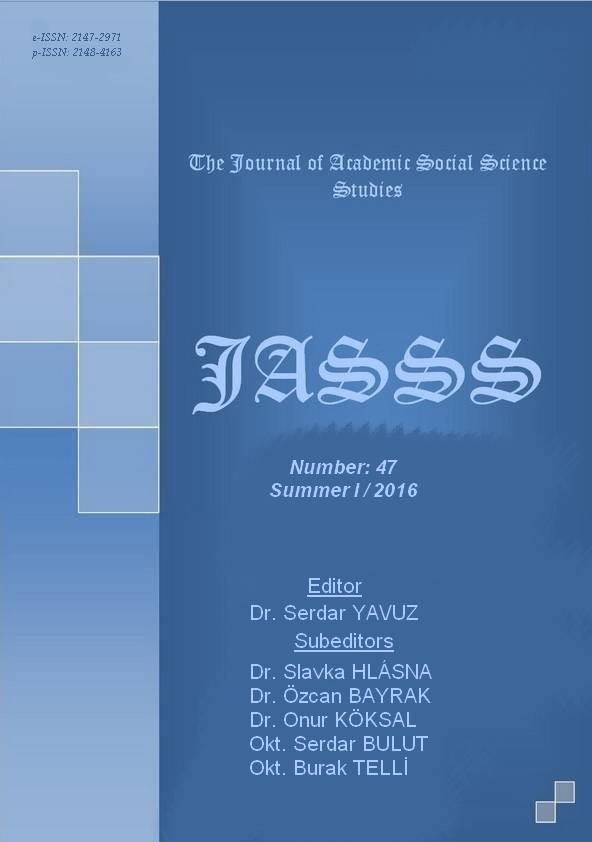MEŞRUİYET KAVRAMI VE BU BAĞLAMDA TÜRKİYE BÜYÜK MİLLET MECLİSİ’NİN ÜYELERİ TARAFINDAN ORTAYA KONULAN YAKLAŞIMLAR
Author :
Abstract
Meşruiyet; meşru olma, kanuna uygun bulunma demek olup, iktidar sahibinin veya prensipler sisteminin haklılığı, siyasî iktidarın halkın rızasına ve tasvibine dayandırılması durumudur. Bu temelde vatan ve namusun muhafaza edilmesi amacıyla ülkenin muhtelif yerlerinde askerî ve silahlı direniş teşkilâtları oluşturulmuş, kongreler toplanmıştır. Anadolu halkı, Mustafa Kemal Paşa önderliğinde başkaldırmış, haksız işgaller ve bu işgaller karşısında, direnmenin ve meşrulaşma çabalarının bir neticesi, Müdafaa-i Hukuk hareketi ve Heyet-i Temsiliye ortaya çıkmıştır. Kongre, bir çeşit yasama, Heyet-i Temsiliye ise yürütme organı şeklini almıştır. Millet ve millî tabirlerinin din, dil, tarih ve soy ve kader birliği ile birbirine bağlı olan bir topluluğu ifade ettiği anlaşılmış, millet ve milliyet kavramları Türk tarihinin ve kültürünün kaçınılmaz bir gelişmesi neticesinde yavaş yavaş siyasî bir kavram şekline bürünmüştü. Bu durum, ülke sınırları dâhilinde bulunan insanları hürriyet ve istiklâl fikri etrafında birleştirmiştir. Son Osmanlı Mebuslar Meclisi’nin 16 Mart 1920 tarihindeki İstanbul’un fiilen işgali üzerine çalışmaz hâle düşmüş, Mebuslar Meclisi’nin 11 Nisan 1920 tarihinde resmen feshedilmesi ülkede meşrutiyet idaresinin kaldırılarak millet temsilcilerine dayanmayan bir keyfî idare hükümetinin çalışmasına imkân vermiştir. Millî Misak’ı yapmış ve onu gerçekleştireceğine and etmiş bir Mebuslar Meclisi’nin ortadan kalkması, milletvekillerinin Malta’ya sürgüne gönderilmesi, Türkleri millî iradesini dile getirecek bir resmî müesseseden mahrum bırakmıştır. TBMM, siyasî iktidarın varlık sebebinin halk için akıllıca iş gören bir anlama kavuşturulduğu, halkın rızası ve onayına dayanan, toplumsal mutabakatı yansıtan bir organ olmuş, milletin tek temsilcisi sıfatıyla kuvvetler birliği sistemini benimsemiş, yeni bir Türk Devleti'nin esaslarını belirlemiş ve İstiklâl Mücadelesi’nin sevk ve idare edeni olmuştur.
Keywords
Abstract
Legitimacy is the state or quality of being legal and denotes the justness of a government or its system of principles. The concept also stipulates a political power based on the consent and assent of people. On this basis, numerous armed resistance movements were organised and several congresses were held accross the country in order to protect the nation and its honour. Anatolian people resisted under the leadership of Mustafa Kemal Pasha. Mudafaa-i Hukuk movement and Hey’et-i Temsiliye emerged as a consequence of those efforts to resist and be legitimate against unjust occupations. The Congress became a sort of legislative body and Hey’et-i Temsiliye was transformed into an executive organ. The notions of nation and national were used to denote a community whose members are bound to each other in terms of sharing a common religion, language, history, lineage and fate. These notions of nation and nationality were transformed into a political concept as an inevitable result of Turkish history and culture. This frame of mind united Anatolian people under the umbrellas of freedom and independence. The last Ottoman parliament became inoperative after the occupation of Istanbul on 16 March 1920. Its formal dissolution on 11 April 1920 led to an arbitrary regime not based on constitutionalism and national representatives. The parliament whose members took an oath to realise the National Pact (Mîsak-ı Millî) was terminated and the MPs were exiled to Malta. This circumstance meant that the Turkish people were deprived of a formal institution to represent their will. The Turkish Grand National Assembly became a body in which the raison d'être of political power gained a functional meaning for people, representing the social consensus, based on the public consent and assent. The assembly adopted the principle of separation of powers, specified the bases of the New Turkish State, and conducted the National War of Independence.





